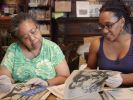Eye For Film >> Movies >> The Archivettes (2019) Film Review
The Archivettes
Reviewed by: Jennie Kermode

Founded in Manhattan in 1974 and later relocated to a Brooklyn brownstone, the Lesbian Herstory Archives in New York City began as a passion project for activists Joan Nestle, Deborah Edel, Sahli Cavallo, Pamela Oline, and Julia Penelope Stanley. They have grown into the single most important record of lesbian history in the world. Megan Rossman's documentary, extended from her 2017 short film Love Letter Rescue Squad, sets out to uncover the history of how this happened and to explain just what it is that makes the archives such a valuable resource.
First things first; the word herstory is in essence an artistic and political statement. The archive's founders, and Rossman, are perfectly aware of the etymology of history and, indeed, their choice might be seen as a useful filter, helping them to avoid wasting time with the sort of people who like to argue about it. What it also does it to emphasise the fact that back in the Seventies women's history more generally was an area with very little support. Women's lives were thought of as comparatively insignificant, so nobody talked about them, so nobody noticed how many women had achieved extraordinary things, so it was assumed that women's lives were insignificant. The Herstory archive not only challenged that view, it also made the case that there is value in the ordinary. By collecting love letters and, later, a huge range of other documents, diaries, photographs and paraphernalia detailing lesbians' private lives, it uncovered bigger stories that might otherwise have been entirely overlooked.

There's an extra significance to this where lesbian history is concerned. Most of the women contributing to the archives didn't have children. They never had sex with men, or their children were taken away from them when they came out, or (until recently) they were forbidden to adopt. As a consequence there were no heirs to whom they could pass on their stories.This was advantageous to the archive in terms of the legacy funding it received. It was rather overwhelming in terms of the sheer quantity of material it received, all of which had to be - and still has to be - organised and processed and catalogued before being stored for posterity or accessed by researchers.
Filmed almost entirely within the confines of the archives themselves - where the walls are lined with shelves full of documents from floor to ceiling, tables are covered in documents and everyone is clambering over boxes - the documentary relies heavily on interviews but finds rich pickings in the extensive experience of the 'archivettes', who reflect not only on the archives themselves but on the political and social movements they document. They share personal stories - two of the original volunteers fell in love and spent many happy years together - and they talk about some of the more colourful characters they met along the way.
Itself an important contribution to lesbian history, the film uses photographs and snippets of archive material to bring viewers closer to the human stories that came close to being lost. Like the archive, it emphasises the importance - to any social group - of having an accessible past which can inform the present. By demonstrating how far movements for lesbian equality have come, film and archive also make it possible to hold onto hope for a brighter future.
Reviewed on: 21 Jul 2019















